Want more variety in your healthy diet during the chilly season? Then you need to get to know the squash family, one of the biggest and most diverse group of vegetables. They come in many shapes and colors, each with its own distinct flavor and texture, and all are low in calories and loaded with nutrients. Right now is prime time for enjoying the different kinds of winter squash, the hard-skinned types that can be stored without refrigeration (as opposed to summer squash such as zucchini). Here are seven winter squash you and your family will love, and ideas for how to eat them:
1. Butternut Squash
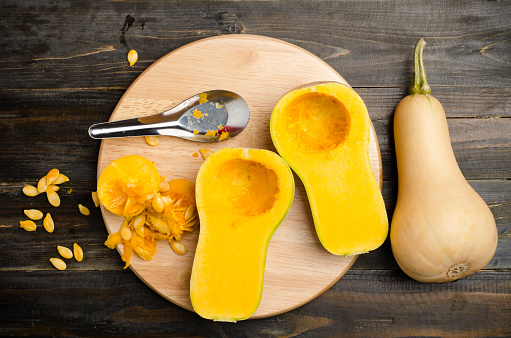
A tube-shaped squash with a bulbous end, butternut has smooth, buff-colored skin. The fine-textured, deep-orange flesh tastes similar to sweet potatoes, though some liken the flavor to butterscotch.
Nutrisystem Category: SmartCarb
Nutrition Highlights: A one-cup serving has 63 calories, 2.8 grams of fiber, no fat and negligible amounts of sodium, but it gives you 14 percent of your RDA for potassium and a whopping 297 percent of your daily vitamin A supply.
Try: Because of its smooth (non-stringy) texture, butternut is ideal for soups and many bakers prefer it to pumpkin for making pies. Try this Creamy Butternut Squash Soup perfect for cool weather.
2. Acorn Squash
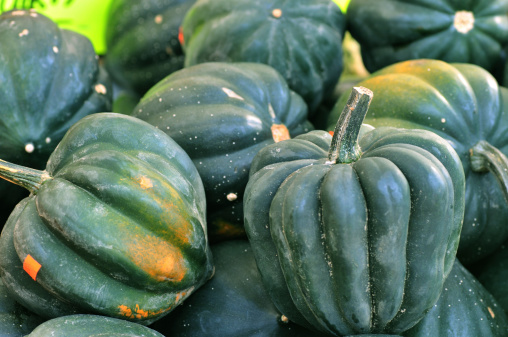
As the name suggests, this squash is shaped like an acorn, with distinct ribs on its hard, black-green skin. The golden-yellow flesh inside is sweet with a hint of nuttiness and it is a bit fibrous. Acorn squash tend to be small–mostly between 1 and 3 pounds–so they are easy to cut in half and serve inside their skin.
Nutrisystem Category: SmartCarb
Nutrition Highlights: You get 56 calories, 2.1 grams of fiber, and 25 percent of your RDA for vitamin C in a one-cup serving of acorn squash.
Try: Slow baking brings out the natural sweetness of acorn squash. This Stuffed Acorn Squash recipe is one of our own favorites.
3. Spaghetti Squash
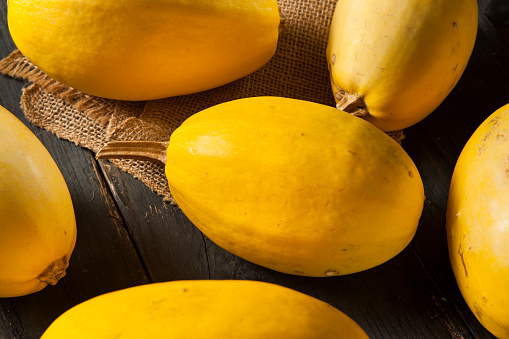
This variety gets its name because when the cooked flesh is scraped from the skin with a fork it comes out in yellow strands that resemble pasta. The whole squash has a watermelon-like shape (though they typically weigh less than 5 pounds) and golden-yellow skin. The flavor is very mild.
Nutrisystem Category: Vegetables
Nutrition Highlights: With just 42 calories per one-cup serving, 2.2 grams of fiber and 10 grams of carbohydrates, spaghetti squash is a better choice than even the healthiest type of pasta. It also gives you 181 milligrams of potassium and almost no sodium.
Try: Substitute baked spaghetti squash for noodles and top with tomato sauce for a healthier take on a family favorite. Watch this quick video to learn how to make it.
4. Delicata Squash
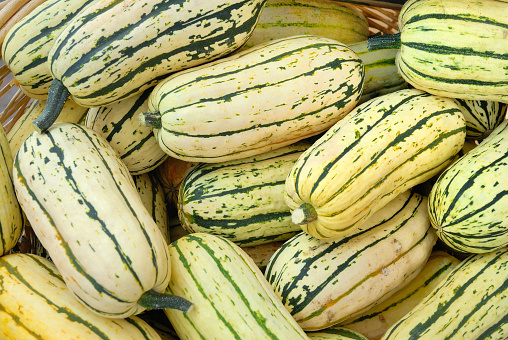
The green-and-white-striped delicata squash may not be as familiar to many people as the first three on this list, but its popularity is rising rapidly because it is so tasty and easy to prepare. The creamy flesh inside tastes like corn, but even sweeter. Delicata has a thinner, more tender skin than other winter squashes; in fact, you can eat the skin rather than remove it.
Nutrisystem Category: SmartCarb
Nutrition Highlights: In one cup of Delicata squash, you get 82 calories, 1.5 grams of fiber, 52 percent of your RDA for vitamin C and 457 percent of the RDA for vitamin A.
Try: Cut in half and then into C-shaped slices, Delicata takes only 15 to 20 minutes to bake and needs little more than a little salt and pepper to highlight its flavors.
5. Hubbard Squash
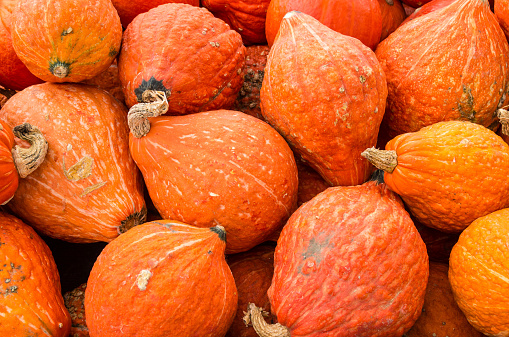
One of the largest varieties, hubbard squash typically weigh 8 to 20 pounds. Their roundish shape and nubbly skin resembles that of their close cousin, pumpkins, though hubbard’s outer color ranges from orange to grayish blue. Beneath the hard skin, the yellow flesh is sweet, dry and fine-textured.
Nutrisystem Category: SmartCarb
Nutrition Highlights: Hubbards have comparatively high sugar content, which pushes up the calorie count in a one-cup serving to 102. But it comes with 10 grams of fiber, 734 milligrams of potassium, and no fat.
Try: You can bake hubbard squash whole–just use a knife to pierce the skin in a few places to allow air to escape. For the best flavor, roast halves of squash, cut side up in a shallow pan of water for about 1 hour.
6. Kabocha Squash

Also known as Hokkaido or Japanese Pumpkin, kabocha has green, bluish-gray, or deep orange skin. The deep yellow or pale orange flesh inside has a lightly sweet flavor and a dry, flaky texture. Kabocha squash tend to be small (most are 2 to 3 pounds), so they are often used as a substitute for pumpkins, when a smaller squash would be easier to cook.
Nutrisystem Category: SmartCarb
Nutrition Highlights: One cup of kabocha squash has 53 calories, 3 grams of fiber and 8 grams of total carbohydrates. Because it’s so low in calories, you can enjoy two cups as a SmartCarb choice on Nutrisystem.
Try: Roasted kabocha cut into cubes adds a hint of sweetness to salads or mixed vegetable medleys. Adding pureed kabocha helps make stews and soups thicker.
7. Calabaza Squash
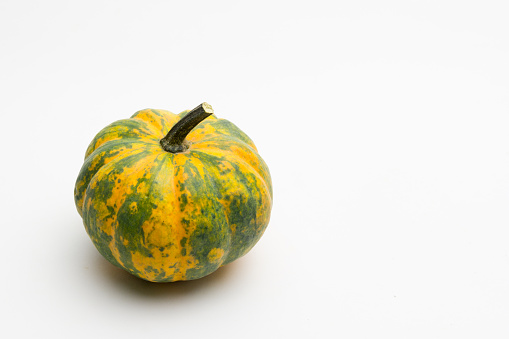
People with Caribbean heritage will recognize the calabaza, which is also called West Indian pumpkin because of its shape and color. The very hard skin may be tan, green, or reddish orange. The golden orange flesh is sweeter and juicier than most other winter squashes and the texture is smooth, like the butternut.
Nutrisystem Category: SmartCarb
Nutrition Highlights: You get 76 calories, 5.7 grams of fiber, 6.8 grams of sugar, 33 percent of your RDA for vitamin C, and almost 300 percent of your daily vitamin A needs from a one-cup serving.
Try: Chunks of steamed calabaza are a tender addition to rice and salads. Roasted calabaza seeds are also tasty and loaded with nutrients.
The post 7 Squash Varieties to Try This Season appeared first on The Leaf.
from The Leaf https://ift.tt/h6fPRkU






